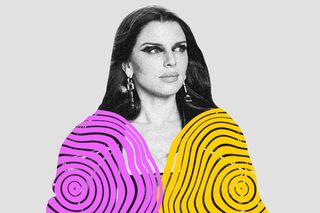
How Julia Fox Disrupts Female Celebrity
Nobody really knows what she does — but that’s now part of the intrigue rather than the joke.

Women and stardom have shared a complex, dizzying relationship. The scrutiny of fame can get almost unbearable — with women, in particular, forced to optimize their bodies, their speech, and their very lives according to the unwavering gaze of cameras trained on them. Enter 2022, and with it, Julia Fox and her celebrity: a chimerical phenomenon that defies explanation. That famous aphorism about Kim Kardashian, and how she’s famous for being famous? That’s Julia Fox now — except being famous for being famous has never been more intriguing.
“Fox is a woman of many titles,” Vanity Fair noted: “mother, model, onetime dominatrix, former Yorkville resident, downtown It person, and, crucially via all that, a micro-celebrity to a certain corner of New Yawk social media.”
Officially, she’s a model and an actor. But her name really started doing the rounds when she began dating Kanye West shortly after his split from Kim Kardashian. Now, Fox said it was more her taking one for the team: she was with him so he’d get off Kardashian’s back. Her name trends every other day for seemingly no reason: a genre-bending fashion look here, a podcast there, and a TikTok about aging being hot through it all. For the present moment in the zeitgeist, Fox represents the kind of careless, nihilistic irreverence that’s refreshing right now — it goes against the grain of female celebrity itself. It’s the anti-curation aesthetic, the ultimate postmodern fantasy where anything goes.
Female celebrity has been overwhelmingly defined by the virgin/whore dichotomy, scholars note. Britney Spears’ treatment in the media is a prime example: she was scrutinized for her virginity, and the lack of it; then, her femininity, and the lack of it. Headlines about her baldness and her breakdown epitomized the way women have been paraded for consumption. And while we’re in the Freed Britney era, we’ve still not reckoned fully with the costs of female celebrity.
If celebrity culture in the 2000s was about dissecting women in the public eye and creating a cycle of destruction and pain, this new decade is different. Julia Fox embodies a kind of anti-celebrity: one who already comes from a place of pain, and who has entered the limelight without anything further to lose. And so she says whatever she wants — and, importantly, she says things in the first place.
Related on The Swaddle:
The New Marilyn Monroe Film Forces Us to Examine Which Women Carry Timeless Intrigue — And Why
The most surprising thing about Fox is her candidness — there’s seemingly no old, sexist accusation typically leveled at female celebrities that one can level at her without it bouncing right off. If she’s wearing unflattering makeup looks, it’s because she’s done catering to the male gaze. “I pretty much, in my teens, learned that I was a commodity and that I can get money or resources from men, so then it just became this game of, [okay], how do I become more desirable so I could get more money, and I could be like that b****,” she said on a podcast recently, describing her experience working as a dominatrix.
Similarly, if she’s called a gold-digger for her stint with Kanye West, she expresses gratitude to him for giving her “priceless exposure” to the world of fashion.
She’s no longer a projection of superficiality — the focus is less on her body and appearance conforming to a norm, than it is on her non-conformity, both in terms of the things she says, wears, and does. When she stood up for Amber Heard recently, she was one of the very few women in public life to do so. “The thing that really sets Fox apart from the models and fellow actors, the influencers and the socialites, is that she talks. She talks and talks,” Vanity Fair added.
It’s not possible to ignore the fact that Julia Fox is the focal point of a moment in culture where she’s a shapeshifter, almost a canvas for a discourse of any kind to take place upon. TikTok is busy turning her into a feminist icon, but a section of Twitter isn’t buying it. White women being quirky have always been valorized in ways that black or brown women haven’t been, goes the critique.
Granted, she’s still thin, white, able-bodied, and conventionally attractive. Each of these facets is in itself cultural currency. But the fact that she wields them all with careless abandon feels, simultaneously, like both their subversion and their reinforcement. But this is a sign of female celebrity shifting: we’re no longer talking about her personal life against her will, we’re talking about the meaning of Julia Fox — and, thereby, about whiteness, privilege, beauty, sex, desire, power, and feminism.
In the end, it’s her infallibility that makes her interesting — over and above the designers she wears, or whom she dates. We’re no longer talking about her, we’re talking around her. And that’s a relief.
Rohitha Naraharisetty is a Senior Associate Editor at The Swaddle. She writes about the intersection of gender, caste, social movements, and pop culture. She can be found on Instagram at @rohitha_97 or on Twitter at @romimacaronii.
Related


Why People Might Feel Lonelier as They Age
